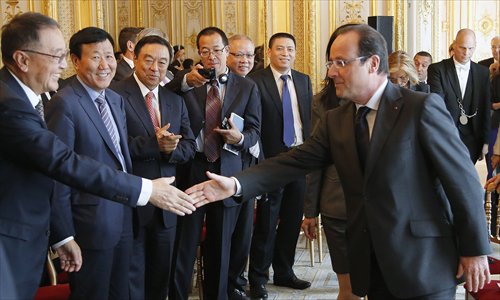Pay to play?
Agencies cash in on small business owners’ eagerness to travel with State leaders on foreign trips

French President Francois Hollande shakes hands with Liu Chuanzhi, CEO and founder of personal computer giant Lenovo, during a meeting with Chinese business leaders in Paris on June 25, 2013. Photo: CFP
It's two months before a biannual summit on China-EU economic and business cooperation in Hamburg, Germany, and agencies in China are advertising a VIP trip open to all entrepreneurs who want to attend. For the right price, the agencies claim, attendees can have their pictures taken with Chinese State leaders also on the trip, or even have dinner with the leaders.
"You'll be able to see Premier Li Keqiang, take a photo with him, or possibly even have dinner with him," an individual named Cao, who described himself as the person in charge of the "International Strategic Alliance of Chinese Enterprises," told a reporter for the Beijing Youth Daily disguised as an interested company representative.
"I can even arrange a meeting for you with a former French president or governors, no problem," Cao said.
When the reporter texted him asking whether Cao could arrange a person-to-person handshake and photo opportunity, Cao replied it is better to discuss face-to-face at his office. "It's not appropriate to leave written information. State leaders' matters are arranged by the government, [so this could be] leaking state secrets. You need to have political sense."
89,000 yuan a person
According to materials provided by Cao, this trip will involve a "high-level delegation" visiting Germany and France to attend the Hamburg summit on October 10 and 11. Chinese and German leaders have confirmed their attendance at the summit.
The entire trip will last nine days. To attend entrepreneurs must pay 89,000 yuan ($14,460) to cover transport, hotels and a "registration fee."
"As long as you have no record of crime or drug use, an entrepreneur can easily pass the qualification assessment," Cao said, adding that the delegation usually includes about 50 people.
The authenticity of Cao's company aroused the reporter's suspicion. The letterhead of the invitation letter Cao sent to the reporter showed "China International Investment and Trade Commission," while the company chop stamped at the end of the letter read "China Association for Promoting International Economic & Technical Cooperation & Investment and Trade Commission."
When the reporter checked a list of non-government organizations listed on the Ministry of Civil Affairs's website, only a "China Association for Promoting International Economic & Technical Cooperation (CAPIETC)" could be found. On CAPIETC's official website there is no affiliate named "China International Investment and Trade Commission."
When asked, Cao said, these different titles all belong to one organization. "We use different titles for different purposes," he said.
Cao said his organization is affiliated with the China Council for the Promotion of International Trade (CCPIT).
The CCPIT is a well-known semi-official trade body.
However, the Beijing Youth Daily did not find the International Strategic Alliance of Chinese Enterprises on CCPIT's website, nor was the alliance's website accessible, instead displaying a message saying it is down for maintenance. The CCPIT told the reporter it has nothing to do with the CAPIETC.
Money doesn't talk
According to a staffer with the Ministry of Commerce, delegations accompanying State leaders on foreign visits are usually arranged by the Ministry of Foreign Affairs, and are usually composed of heads of large centrally-owned State enterprises, government officials and other accompanying personnel. Only when the trip involves business activities does the Ministry of Commerce take charge of organizing a business delegation. The companies in the delegation are typically those planning to sign important business deals with the destination country.
The delegation will be arranged by government agencies or organizations directly under the Ministry of Commerce, and will definitely not by other non-government agencies, the staffer told the Beijing Youth Daily. Small and medium-sized enterprises in China are usually not involved in such foreign trips. "You can't just pay money and come," the staffer said.
The names of the government agencies or organizations entitled to arrange such delegations can be found on the Ministry of Commerce's website.
A staff member with the Ministry of Commerce's Investment Promotion Agency told the Beijing Youth Daily that the official agency usually checks an applying enterprise's qualifications by checking its business license and operational scope, and verifying whether the company is planning to sign business deals with the destination country.
The agency does not disclose at the application stage whether State leaders will be in attendance, nor does it promise that participants will have the opportunity to shake hands or take photos with the leaders. "We won't let them go if their only goal is to take a picture with a State leader," she said.
The staffer said that she has long heard of illicit agencies doing business of this kind using the names of officially-designated organizations, copying the letterhead of official documents and sending them to companies to make money.
The official practice for charging entrepreneurs on delegations is to charge for hotel, flights and other transport, plus a 10 percent "management fee," she said.
Guo Jinyue, a scholar with China Institute of International Studies, said it is not new for Chinese entrepreneurs to be eager to join State leaders' foreign trips.
As more and more foreign visits by State leaders involve business talks, an increasing number of business delegations are also being invited to go along.
Many small business owners try to join such delegations, wanting to get a picture taken with State leaders to promote themselves back home, Guo said.
Foreign politicians also sometimes take advantage of this tendency among Chinese business people. Hillary Clinton, then a US senator, raised money in 2007 for the 2008 presidential election from Chinese communities in New York by offering to invite business people to dinner and taking photos with them one by one.
